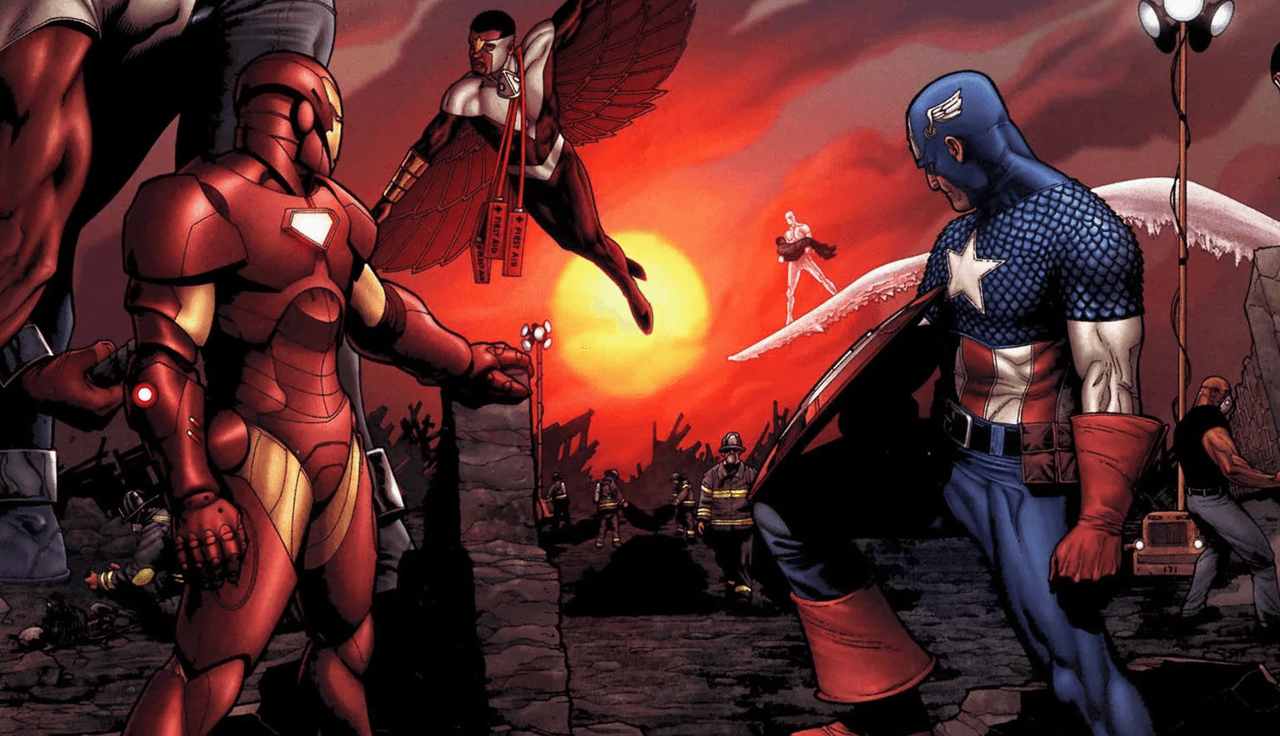If you click on a link and make a purchase we may receive a small commission. Read our editorial policy.
Marvel's Civil War almost had Captain America & Iron Man's roles reversed
Somewhere in a parallel universe, Chris Evans' Steve Rogers and Robert Downey Jr.'s Tony Stark were on the opposite sides of the Sokovia Accords in Captain America: Civil War

Popverse's top stories of the day
- WATCH NOW: The gentleman villain Mads Mikkelsen tells us how he balances being charming and despicable in our favorite movies & TV series
- DC Comics loses its long-time publicity manager Michael Shelling
- MEMBERS ONLY: Popverse Picks: Best underdog characters like Cassian Andor in Star Wars
This week, Marvel fans are thinking about an alternate timeline for some of their favorite superheroes... but not because season 3 of Disney+'s What If...? is just around the corner. No, fans' visions of a parallel universe come from the Marvel editorial team, one of whom just revealed that the tentpole comic book event Civil War almost played out the exact opposite way, with Captain America's and Iron Man's roles reversed.
The news comes from Marvel executive editor Tom Brevoort, in his weekly substack Man with a Hat. The topic of Civil War came up via reader Christpher Orrell, who asked if there was any "division in the office over the Registration Act and the political themes of the event?" (In case you don't know, the Registration Act was US government legislation that disallowed Marvel's heroes to keep their identities secret. It has a kind of parallel in the MCU, but we'll get to that in a moment).
"The core concept of it was Mark Millar’s," Brevoort writes, referencing the best-selling author of not just this Marvel title, but also Kick-Ass and Superman: Red Son, "and he was the one who put forth the conflict as being between Captain America and Iron Man." But the original idea that Millar pitched - which had Captain America in favor of the Registration Act and Iron Man leading the charge to oppose it - didn't make sense to Brevoort, as he went on to explain.
"I was the one who piped up and said that [Steve's and Tony's placement] was wrong," Brevoort writes, "Captain America has almost never been presented as a 'my country right or wrong' kind of a figure. If anything, he’s more sympatico with the FDR 'New Deal' agenda. So him choosing to throw in with hunting down other heroes felt like a misrepresentation of the character. Iron Man, on the other hand, was a futurist as well as somebody who had a long history of working with the government in building armaments, so it made more sense to me that Tony Stark would see Registration as a necessary step and put his weight behind it."
It's a fascinating thing to think about, as their respective sides of the line-wide Marvel event have gone on to inform the characters' personalities even to this day. In fact, Steve Rogers was killed at the end of the event, leading Bucky Barnes to take over as Sentinel of Liberty until Rogers's inevitable resurrection. One has to wonder if Tony Stark would've caught the bullet at the end of the series, had Millar's original plan gone through.
And if we're thinking along those lines, the obvious next logical question for so many comic readers would be: - would Captain America: Civil War have been a different movie? The MCU's version of the Registration Act were the Sokovia Accords, legislation that would give the world's governments control over the Avengers. This was inspired by the events of Age of Ultron, after which the world was mistrustful of Tony Stark for constructing the titular villain.
In my humble opinion, I feel that whatever happened in Marvel's Civil War, the film that took its name would have transpired pretty much the same way it did in our reality. Consider the difference in Tony Stark's character between Iron Man 2 and the end of Age of Ultron; in the former film, he refuses to give up the plans for the Iron Man suit to the US government, saying that he's "privatized world peace." In the latter, he is left blaming himself for the deaths of thousands after an unchecked invention of his becomes bent on destroying humanity. Call me crazy, but I think his guilt after that movie's events would have had him pretty comfortable with signing up for a system of checks and balances.
But then again, I certainly can't say for sure. Though I've got an opinion, it's a question for wiser minds than mine.
Or perhaps for another What If...? story.
Captain America: Civil War is streaming on Disney+.
Keep up to date on Popverse's Marvel coverage, with these highlights:
- The MCU needs Anya Taylor-Joy's Magik in it (and not just for the X-Men connection)
- How Disney+'s What If...? is the moonshot for the next 50 years of Marvel Studios & the MCU
- Marvel Studios has accidentally created a new Phase that predates Phases 1 - 6: the MCU Phase Zero
- Overgrown children of the atom: Marvel's X-Men can't evolve past their '90s commercial peak
- The biggest outstanding questions of the Marvel Studios' movies & TV shows
- Donald Trump is the landlord for Marvel's House of Ideas
- Marvel Studios swapping out Doctor Doom for Kang offers the chance to jettison the Multiverse Saga
- What Marvel Studios boss Kevin Feige is saying (and not saying) about the MCU X-Men franchise says a lot about the future of the Mutant Saga
- If Marvel is going to bring Loki back for Secret Wars, it's time to give him an upgrade
- In 2021, Sony's boss said people won't miss Spider-Man in its Spider-adjacent movie. Turns out, they do.
Follow Popverse for upcoming event coverage and news
Find out how we conduct our review by reading our review policy
Let Popverse be your tour guide through the wilderness of pop culture
Sign in and let us help you find your new favorite thing.
















Comments
Want to join the discussion? Please activate your account first.
Visit Reedpop ID if you need to resend the confirmation email.